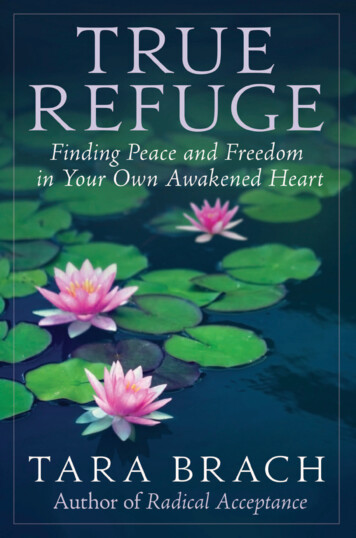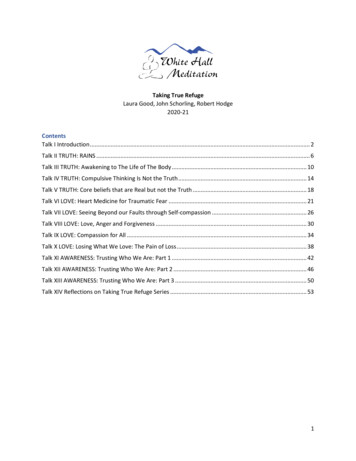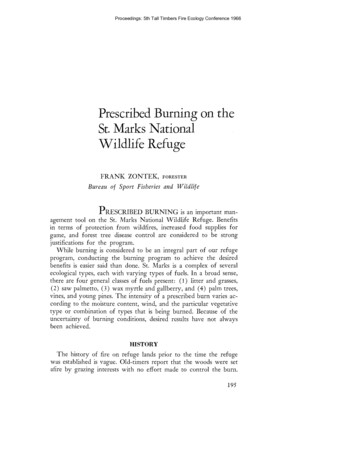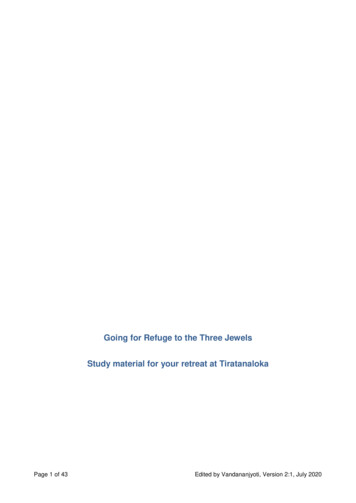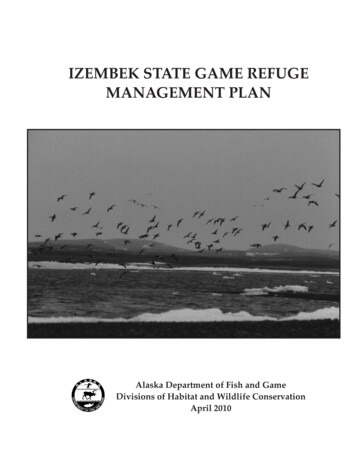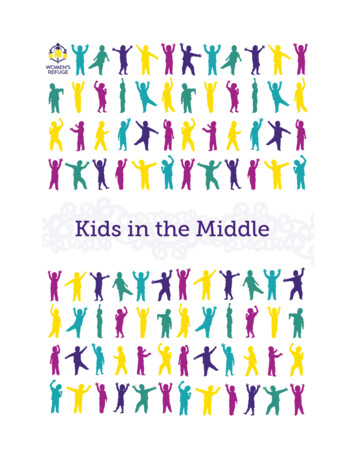
Transcription
RefugeAn Introduction to theBuddha, Dhamma, & SanghabyThanissaro Bhikkhu(Geoffrey DeGraff)for free distribution
2 Thanissaro Bhikkhu, 1996This book may be copied or reprinted for free distributionwithout permission from the copyright holder.Otherwise all rights reserved.Fifth edition, revised, 2012
3They go to many a refuge,to mountains, forests,parks, trees, and shrines:people threatened with danger.That’s not the secure refuge,that’s not the supreme refuge,that’s not the refuge,having gone to which,you gain releasefrom all suffering and stress.But when, having gone for refugeto the Buddha, Dhamma, and Sangha,you see with right discernmentthe four noble truths—stress,the cause of stress,the transcending of stress,and the noble eightfold path,the way to the stilling of stress:That’s the secure refuge,that, the supreme refuge,that is the refuge,having gone to which,you gain releasefrom all suffering and stress.—Dhp, 188-192
4ContentsPrefaceI. Introduction: Going for RefugeII. ReadingsBUDDHADHAMMABasic ionThe Four Noble TruthsLiberationSANGHAIII. EssaysBUDDHAThe Meaning of the Buddha’s AwakeningDHAMMALife Isn’t Just SufferingNo-self or Not-self?NibbanaSANGHAThe Economy of GiftsS U M M A RYA Refuge in Skillful ActionGlossaryAbbreviations
5PrefaceThis book is a short introduction to the basic principles of Buddhism: theBuddha, the Dhamma (his teachings), and Sangha (the community of his nobledisciples), also known as the Triple Gem or the Triple Refuge. The material isdivided into three parts: (I) an introductory essay on the meaning of refuge andthe act of going for refuge; (II) a series of readings drawn from the earliestBuddhist texts illustrating the essential qualities of the Triple Gem; and (III) a setof essays explaining aspects of the Triple Gem that often provoke questions inthose who are new to the Buddha’s teachings. This last section concludes with anessay that summarizes, in a more systematic form, many of the points raised inthe earlier parts of the book.The readings on Dhamma form the core of the book, organized in a pattern—called a graduated discourse (anupubbi-katha)—that the Buddha himself oftenused when introducing his teachings to new listeners. After beginning with thejoys of generosity, he would describe the joys of a virtuous life, followed by therewards of generosity and virtue to be experienced here and, after death, inheaven; the drawbacks of sensual pleasures, even heavenly ones; and therewards of renunciation. Then, when he sensed that his listeners were inclined tolook favorably on renunciation as a way to true happiness, he would discuss thecentral message of his teaching: the four noble truths.My hope is that this introduction will help answer many of the questions thatnewcomers bring to Buddhism, and will spark new questions in their minds asthey contemplate the possibility of developing within their own lives thequalities of refuge exemplified by the Triple Gem.Thanissaro BhikkhuM E T TA F O R E S T M O N A S T E RYVA L L E Y C E N T E R , C A 9 2 0 8 2 - 1 4 0 9U.S.A.
6I. IntroductionGoing for RefugeThe act of going for refuge marks the point where one commits oneself totaking the Dhamma, or the Buddha’s teaching, as the primary guide to one’s life.To understand why this commitment is called a “refuge,” it’s helpful to look atthe history of the custom.In pre-Buddhist India, going for refuge meant proclaiming one’s allegiance toa patron—a powerful person or god—submitting to the patron’s directives inhopes of receiving protection from danger in return. In the early years of theBuddha’s teaching career, his new followers adopted this custom to express theirallegiance to the Buddha, Dhamma, and Sangha, but in the Buddhist context thiscustom took on a new meaning.Buddhism is not a theistic religion—the Buddha is not a god—and so aperson taking refuge in the Buddhist sense is not asking for the Buddhapersonally to intervene to provide protection. Still, one of the Buddha’s centralteachings is that human life is fraught with dangers—from greed, anger, anddelusion—and so the concept of refuge is central to the path of practice, in thatthe practice is aimed at gaining release from those dangers. Because the mind isthe source both of the dangers and of release, there is a need for two levels ofrefuge: external refuges, which provide models and guidelines so that we canidentify which qualities in the mind lead to danger and which to release; andinternal refuges, i.e., the qualities leading to release that we develop in our ownmind in imitation of our external models. The internal level is where true refugeis found.Although the tradition of going to refuge is an ancient practice, it is stillrelevant for our own practice today, for we are faced with the same internaldangers that faced people in the Buddha’s time. We still need the same protectionas they. When a Buddhist takes refuge, it is essentially an act of taking refuge inthe doctrine of karma: It’s an act of submission in that one is committed to livingin line with the principle that actions based on skillful intentions lead tohappiness, while actions based on unskillful intentions lead to suffering; it’s anact of claiming protection in that, by following the teaching, one hopes to avoidthe misfortunes that bad karma engenders. To take refuge in this way ultimatelymeans to take refuge in the quality of our own intentions, for that’s where theessence of karma lies.The refuges in Buddhism—both on the internal and on the external levels—are the Buddha, Dhamma, and Sangha, also known as the Triple Gem. They arecalled gems both because they are valuable and because, in ancient times, gemswere believed to have protective powers. The Triple Gem outdoes other gems inthis respect because its protective powers can be put to the test and can lead
7further than those of any physical gem, all the way to absolute freedom from theuncertainties of the realm of aging, illness, and death.The Buddha, on the external level, refers to Siddhattha Gotama, the Indianprince who renounced his royal titles and went into the forest, meditating untilhe ultimately gained awakening. To take refuge in the Buddha means, not takingrefuge in him as a person, but taking refuge in the fact of his awakening: placingtrust in the belief that he did awaken to the truth, that he did so by developingqualities that we too can develop, and that the truths to which he awoke providethe best perspective for the conduct of our life.The Dhamma, on the external level, refers to the path of practice the Buddhataught to this followers. This, in turn, is divided into three levels: the words ofhis teachings, the act of putting those teachings into practice, and the attainmentof awakening as the result of that practice. This three-way division of the word“Dhamma” acts as a map showing how to take the external refuges and makethem internal: learning about the teachings, using them to develop the qualitiesthat the Buddha himself used to attain awakening, and then realizing the samerelease from danger that he found in the quality of Deathlessness that we cantouch within.The word Sangha, on the external level, has two senses: conventional andideal. In its ideal sense, the Sangha consists of all people, lay or ordained, whohave practiced the Dhamma to the point of gaining at least a glimpse of theDeathless. In a conventional sense, Sangha denotes the communities of ordainedmonks and nuns. The two meanings overlap but are not necessarily identical.Some members of the ideal Sangha are not ordained; some monks and nuns haveyet to touch the Deathless. All those who take refuge in the Buddha, Dhamma,and Sangha become members of the Buddha’s four-fold assembly (parisa) offollowers: monks, nuns, male lay devotees, and female lay devotees. Althoughthere’s a widespread belief that all Buddhist followers are members of theSangha, this is not the case. Only those who are ordained are members of theconventional Sangha; only those who have glimpsed the Deathless are membersof the ideal Sangha. Nevertheless, any followers who don’t belong to the Sanghain either sense of the word still count as genuine Buddhists in that they aremembers of the Buddha’s parisa.When taking refuge in the external Sangha, one takes refuge in both senses ofthe Sangha, but the two senses provide different levels of refuge. Theconventional Sangha has helped keep the teaching alive for more than 2,500years. Without them, we would never have learned what the Buddha taught.However, not all members of the conventional Sangha are reliable models ofbehavior. So when looking for guidance in the conduct of our lives, we must lookto the living and recorded examples provided by the ideal Sangha. Without theirexample, we would not know (1) that awakening is available to all, and not justto the Buddha; and (2) how awakening expresses itself in real life.On the internal level, the Buddha, Dhamma, and Sangha are the skillfulqualities we develop in our own minds in imitation of our external models. Forinstance, the Buddha was a person of wisdom, purity, and compassion. When wedevelop wisdom, purity, and compassion in our own minds, they form our
8refuge on an internal level. The Buddha tasted awakening by developingconviction, persistence, mindfulness, concentration, and discernment. When wedevelop these same qualities to the point of attaining awakening too, thatawakening is our ultimate refuge. This is the point where the three aspects of theTriple Gem become one: beyond the reach of greed, anger, and delusion, andthus totally secure. This is also the point where we become members of the idealSangha, providing an example for anyone else who wants to find the samesecurity inside.
9II. Readings‘Indeed, the Blessed One [the Buddha] is pure and rightly self-awakened,consummate in knowledge and conduct, well-gone, an expert with regard to thecosmos, unexcelled as a trainer for those people fit to be tamed, the Teacher of divineand human beings, awakened, blessed.’‘The Dhamma is well-expounded by the Blessed One, to be seen here and now,timeless, inviting verification, pertinent, to be realized by the observant forthemselves.’‘The Sangha of the Blessed One’s disciples who have practiced well whohave practiced straight-forwardly who have practiced methodically who havepracticed masterfully—in other words, the four types of noble disciples whentaken as pairs, the eight when taken as individual types—they are the Sangha ofthe Blessed One’s disciples: worthy of gifts, worthy of hospitality, worthy ofofferings, worthy of respect, the incomparable field of merit for the world.’AN 10:92Buddha[The Buddha speaks:] “I lived in refinement, utmost refinement, totalrefinement. My father even had lotus ponds made in our palace: one where redlotuses bloomed, one where white lotuses bloomed, one where blue lotusesbloomed, all for my sake. I used no sandalwood that was not from Varanasi. Myturban was from Varanasi, as were my tunic, my lower garments, and my outercloak. A white sunshade was held over me day and night to protect me fromcold, heat, dust, dirt, and dew.“I had three palaces: one for the cold season, one for the hot season, one forthe rainy season. During the four months of the rainy season I was entertained inthe rainy-season palace by minstrels without a single man among them, and I didnot once come down from the palace. Whereas the servants, workers, andretainers in other people’s homes are fed meals of lentil soup and broken rice, inmy father’s home the servants, workers, and retainers were fed wheat, rice, andmeat.“Even though I was endowed with such fortune, such total refinement, thethought occurred to me: ‘When an untaught, run-of- the-mill person, himselfsubject to aging, not beyond aging, sees another who is aged, he is horrified,humiliated, and disgusted, oblivious to himself that he too is subject to aging, notbeyond aging. If I—who am subject to aging, not beyond aging—were to behorrified, humiliated, and disgusted on seeing another person who is aged, thatwould not be fitting for me.’ As I noticed this, the [typical] young person’sintoxication with youth entirely dropped away.
10“Even though I was endowed with such fortune, such total refinement, thethought occurred to me: ‘When an untaught, run-of-the-mill person, himselfsubject to illness, not beyond illness, sees another who is ill, he is horrified,humiliated, and disgusted, oblivious to himself that he too is subject to illness,not beyond illness. And if I—who am subject to illness, not beyond illness—wereto be horrified, humiliated, and disgusted on seeing another person who is ill,that would not be fitting for me.’ As I noticed this, the healthy person’sintoxication with health entirely dropped away.“Even though I was endowed with such fortune, such total refinement, thethought occurred to me: ‘When an untaught, run-of-the-mill person, himselfsubject to death, not beyond death, sees another who is dead, he is horrified,humiliated, and disgusted, oblivious to himself that he too is subject to death, notbeyond death. And if I—who am subject to death, not beyond death—were to behorrified, humiliated, and disgusted on seeing another person who is dead, thatwould not be fitting for me.’ As I noticed this, the living person’s intoxicationwith life entirely dropped away.”AN 3:38The Quest for Awakening“Before my awakening, when I was still just an unawakened Bodhisatta,being subject myself to birth, aging, illness, death, sorrow, and defilement, Isought [happiness in] what was subject to birth, aging, illness, death, sorrow, anddefilement. The thought occurred to me: ‘Why am I, being subject myself tobirth defilement, seeking what is subject to birth defilement? What if I wereto seek the unborn, unaging, unailing, undying, sorrowless, undefiled,unsurpassed security from bondage: Unbinding.’“So at a later time, when I was still young, black-haired, endowed with theblessings of youth in the first stage of life, I shaved off my hair and beard—though my parents wished otherwise and were grieving with tears on theirfaces—and I put on the ochre robe and went forth from the home life intohomelessness.“Having gone forth in search of what might be skillful, seeking theunexcelled state of sublime peace, I went to where Alara Kalama was stayingand, on arrival, said to him: ‘I want to practice in this doctrine and discipline.’“When this was said, he replied to me, ‘You may stay here. This doctrine issuch that a wise person can soon enter and dwell in his own teacher’sknowledge, having realized it for himself through direct knowledge.’“I quickly learned the doctrine. As far as mere lip-reciting and repetition, Icould speak the words of knowledge, the words of the elders, and I could affirmthat I knew and saw—I, along with others.“I thought: ‘It isn’t through mere conviction alone that Alara Kalama declares,“I have entered and dwell in this Dhamma, having realized it directly formyself.” Certainly he dwells knowing and seeing this Dhamma.’ So I went tohim and said, ‘To what extent do you declare that you have entered and dwell in
11this Dhamma?’ When this was said, he declared the dimension of nothingness.“I thought: ‘Not only does Alara Kalama have conviction, persistence,mindfulness, concentration, and discernment. I, too, have conviction, persistence,mindfulness, concentration, and discernment. Suppose I were to endeavor torealize for myself the Dhamma that Alara Kalama declares he has entered anddwells in .’ So it was not long before I entered and dwelled in that Dhamma,having realized it for myself through direct knowledge. I went to him and said,‘Friend Kalama, is this the extent to which you have entered and dwell in thisDhamma, having realized it for yourself through direct knowledge?’“‘Yes .’“‘This is the extent to which I, too, have entered and dwell in this Dhamma,having realized it for myself through direct knowledge.’“‘It is a gain for us, a great gain for us, that we have such a companion in theholy life . As I am, so are you; as you are, so am I. Come friend, let us now leadthis community together.’“In this way did Alara Kalama, my teacher, place me, his pupil, on the samelevel with himself and pay me great honor. But the thought occurred to me, ‘ThisDhamma leads not to disenchantment, to dispassion, to cessation, to stilling, todirect knowledge, to awakening, nor to Unbinding, but only to reappearance inthe sphere of nothingness.’ So, dissatisfied with that Dhamma, I left.”MN 26“Now, Aggivessana, these three similes—spontaneous, never before heard—appeared to me. Suppose there were a wet, sappy piece of timber lying in thewater, and a man were to come along with an upper fire-stick, thinking, ‘I’ll lighta fire. I’ll produce heat.’ Now what do you think? Would he be able to light a fireand produce heat by rubbing the upper fire-stick in the wet, sappy timber lyingin the water?”“No, venerable sir .”“So it is with any contemplative or brahman who does not live withdrawnfrom sensuality in body and mind, and whose desire, infatuation, urge, thirst,and fever for sensuality is not relinquished and stilled within him: Whether ornot he feels painful, racking, piercing feelings due to his striving [for awakening],he is incapable of knowledge, vision, and unexcelled self-awakening .“Then a second simile—spontaneous, never before heard—appeared to me.Suppose there were a wet, sappy piece of timber lying on land far from water,and a man were to come along with an upper fire-stick, thinking, ‘I’ll light a fire.I’ll produce heat.’ Now what do you think? Would he be able to light a fire andproduce heat by rubbing the upper fire-stick in the wet, sappy timber lying onland?”“No, venerable sir .”“So it is with any contemplative or brahman who lives withdrawn fromsensuality in body only, but whose desire, infatuation, urge, thirst, and fever forsensuality is not relinquished and stilled within him: Whether or not he feels
12painful, racking, piercing feelings due to his striving, he is incapable ofknowledge, vision, and unexcelled self-awakening .“Then a third simile—spontaneous, never before heard—appeared to me.Suppose there were a dry, sapless piece of timber lying on land far from water,and a man were to come along with an upper fire-stick, thinking, ‘I’ll light a fire.I’ll produce heat.’ Now what do you think? Would he be able to light a fire andproduce heat by rubbing the upper fire-stick in the dry, sapless timber lying onland?”“Yes, venerable sir .”“So it is with any contemplative or brahman who lives withdrawn fromsensuality in body and mind, and whose desire, infatuation, urge, thirst, andfever for sensuality is relinquished and stilled within him: Whether or not hefeels painful, racking, piercing feelings due to his striving, he is capable ofknowledge, vision, and unexcelled self-awakening .“I thought: ‘Suppose that I, clenching my teeth and pressing my tongueagainst the roof of my mouth, were to beat down, constrain, and crush my mindwith my awareness’ . So, just as if a strong man, seizing a weaker man by thehead or the throat or the shoulders would beat him down, constrain and crushhim, in the same way I beat down, constrained, and crushed my mind with myawareness. As I did so, sweat poured from my armpits. But although tirelesspersistence was aroused in me, and unmuddled mindfulness established, mybody was aroused and uncalm because of the painful exertion. But the painfulfeeling that arose in this way did not invade my mind or remain.“I thought: ‘Suppose I were to become absorbed in the trance of nonbreathing.’ So I stopped the in-breaths and out-breaths in my nose and mouth. AsI did so, there was a loud roaring of winds coming out my earholes, just like theloud roar of winds coming out of a smith’s bellows . So I stopped the in-breathsand out-breaths in my nose and mouth and ears. As I did so, extreme forcessliced through my head, just as if a strong man were slicing my head open with asharp sword . Extreme pains arose in my head, just as if a strong man weretightening a turban made of tough leather straps around my head . Extremeforces carved up my stomach cavity, just as if a butcher or his apprentice were tocarve up the stomach cavity of an ox . There was an extreme burning in mybody, just as if two strong men, grabbing a weaker man by the arms, were toroast and broil him over a pit of hot embers. But although tireless persistence wasaroused in me, and unmuddled mindfulness established, my body was arousedand uncalm because of the painful exertion. But the painful feeling that arose inthis way did not invade my mind or remain.“Devas, on seeing me, said, ‘Gotama the contemplative is dead.’ Other devassaid, ‘He isn’t dead, he’s dying.’ Others said, ‘He’s neither dead nor dying, he’san arahant, for this is the way arahants live.’“I thought: ‘Suppose I were to practice going altogether without food.’ Thendevas came to me and said, ‘Dear sir, please don’t practice going altogetherwithout food. If you go altogether without food, we’ll infuse divine nourishmentin through your pores, and you will survive on that.’ I thought: ‘If I were to claimto be completely fasting while these devas are infusing divine nourishment in
13through my pores, I would be lying.’ So I dismissed them, saying, ‘Enough.’“I thought: ‘Suppose I were to take only a little food at a time, only a handfulat a time of bean soup, lentil soup, vetch soup, or pea soup.’ So I took only a littlefood at a time, only handful at a time of bean soup, lentil soup, vetch soup, orpea soup. My body became extremely emaciated. Simply from my eating so little,my limbs became like the jointed segments of vine stems or bamboo stems .Mybackside became like a camel’s hoof .My spine stood out like a string ofbeads .My ribs jutted out like the jutting rafters of an old, run-down barn .Thegleam of my eyes appeared to be sunk deep in my eye sockets like the gleam ofwater deep in a well .My scalp shriveled and withered like a green bitter gourd,shriveled and withered in the heat and the wind .The skin of my belly becameso stuck to my spine that when I thought of touching my belly, I grabbed hold ofmy spine as well; and when I thought of touching my spine, I grabbed hold ofthe skin of my belly as well .If I urinated or defecated, I fell over on my faceright there .Simply from my eating so little, if I tried to ease my body byrubbing my limbs with my hands, the hair—rotted at its roots—fell from mybody as I rubbed .“I thought: ‘Whatever contemplatives or brahmans in the past have feltpainful, racking, piercing feelings due to their striving, this is the utmost. Nonehave been greater than this. Whatever contemplatives or brahmans in thefuture in the present are feeling painful, racking, piercing feelings due to theirstriving, this is the utmost. None is greater than this. But with this rackingpractice of austerities I have not attained any superior human state, anydistinction in knowledge or vision worthy of the noble ones. Could there beanother path to awakening?’“I thought: ‘I recall once, when my father the Sakyan was working, and I wassitting in the cool shade of a rose-apple tree, then—quite secluded fromsensuality, secluded from unskillful qualities—I entered and remained in the firstjhana: rapture and pleasure born of seclusion, accompanied by directed thoughtand evaluation. Could that be the path to awakening?’ Then there was theconsciousness following on that memory: ‘That is the path to awakening . Sowhy am I afraid of that pleasure that has nothing to do with sensuality, nothingto do with unskillful qualities?’ I thought: ‘I am no longer afraid of thatpleasure but it is not easy to achieve that pleasure with a body so extremelyemaciated .’ So I took some solid food: some rice and porridge. Now fivemonks had been attending on me, thinking, ‘If Gotama, our contemplative,achieves some higher state, he will tell us.’ But when they saw me taking somesolid food—some rice and porridge—they were disgusted and left me, thinking,‘Gotama the contemplative is living luxuriously. He has abandoned his exertionand is backsliding into abundance.’“So when I had taken solid food and regained strength, then—quite secludedfrom sensuality, secluded from unskillful qualities, I entered and remained in thefirst jhana: rapture and pleasure born of seclusion, accompanied by directedthought and evaluation. But the pleasant feeling that arose in this way did notinvade my mind or remain. With the stilling of directed thoughts andevaluations, I entered and remained in the second jhana: rapture and pleasureborn of concentration, unification of awareness free from directed thought and
14evaluation—internal assurance . With the fading of rapture I remainedequanimous, mindful, and alert, and sensed pleasure with the body. I enteredand remained in the third jhana, of which the noble ones declare, ‘Equanimousand mindful, he has a pleasant abiding.’ . With the abandoning of pleasure andpain—as with the earlier disappearance of joy and distress—I entered andremained in the fourth jhana: purity of equanimity and mindfulness, neitherpleasure nor pain. But the pleasant feeling that arose in this way did not invademy mind or remain.“When the mind was thus concentrated, purified, bright, unblemished, rid ofdefilement, pliant, malleable, steady, and attained to imperturbability, I directedit to the knowledge of recollecting my past lives. I recollected my manifold pastlives, i.e., one birth, two five, ten fifty, a hundred, a thousand, a hundredthousand, many eons of cosmic contraction, many eons of cosmic expansion,many eons of cosmic contraction and expansion: ‘There I had such a name,belonged to such a clan, had such an appearance. Such was my food, such myexperience of pleasure and pain, such the end of my life. Passing away from thatstate, I re-arose there. There too I had such a name, belonged to such a clan, hadsuch an appearance. Such was my food, such my experience of pleasure andpain, such the end of my life. Passing away from that state, I re-arose here.’ ThusI remembered my manifold past lives in their modes and details.“This was the first knowledge I attained in the first watch of the night.Ignorance was destroyed; knowledge arose; darkness was destroyed; lightarose—as happens in one who is heedful, ardent, and resolute. But the pleasantfeeling that arose in this way did not invade my mind or remain.“When the mind was thus concentrated, purified, bright, unblemished, rid ofdefilement, pliant, malleable, steady, and attained to imperturbability, I directedit to the knowledge of the passing away and reappearance of beings. I saw—bymeans of the divine eye, purified and surpassing the human—beings passingaway and re-appearing, and I discerned how they are inferior and superior,beautiful and ugly, fortunate and unfortunate in accordance with their kamma:‘These beings—who were endowed with bad conduct of body, speech, and mind,who reviled the noble ones, held wrong views and undertook actions under theinfluence of wrong views—with the break-up of the body, after death, have reappeared in the plane of deprivation, the bad destination, the lower realms, inhell. But these beings—who were endowed with good conduct of body, speechand mind, who did not revile the noble ones, who held right views andundertook actions under the influence of right views—with the break-up of thebody, after death, have re-appeared in the good destinations, in the heavenlyworld.’ Thus—by means of the divine eye, purified and surpassing the human—Isaw beings passing away and re-appearing, and I discerned how they are inferiorand superior, beautiful and ugly, fortunate and unfortunate in accordance withtheir kamma.“This was the second knowledge I attained in the second watch of the night.Ignorance was destroyed; knowledge arose; darkness was destroyed; lightarose—as happens in one who is heedful, ardent, and resolute. But the pleasantfeeling that arose in this way did not invade my mind or remain.“When the mind was thus concentrated, purified, bright, unblemished, rid of
15defilement, pliant, malleable, steady, and attained to imperturbability, I directedit to the knowledge of the ending of the mental effluents (asava). I discerned, as itwas actually present, that ‘This is stress This is the origination of stress Thisis the cessation of stress This is the way leading to the cessation of stress These are effluents This is the origination of effluents This is the cessation ofeffluents This is the way leading to the cessation of effluents.’ My heart, thusknowing, thus seeing, was released from the effluent of sensuality, released fromthe effluent of becoming, released from the effluent of ignorance. With release,there was the knowledge, ‘Released.’ I discerned that ‘Birth is ended, the holy lifefulfilled, the task done. There is nothing further for this world.’“This was the third knowledge I attained in the third watch of the night.Ignorance was destroyed; knowledge arose; darkness was destroyed; lightarose—as happens in one who is heedful, ardent, and resolute. But the pleasantfeeling that arose in this way did not invade my mind or remain.”MN 36Through the round of many births I roamedwithout reward,without rest,seeking the house builder.Painful is birth againand again.House builder, you’re seen!You will not build a house again.All your rafters broken,the ridge pole destroyed,immersed in dismantling, the mindhas attained the end of craving.Dhp 153-54The Buddha’s Passing AwayNow at that time Subhadda the wanderer was staying in Kusinara. He heardthat “Tonight, in the last watch of the night, the total Unbinding of Gotama thecontemplative will take place.” Then this thought occurred to him: “I have heardthe elder wanderers, teachers of teachers, saying that only once in a long, longtime do
refuge: external refuges, which provide models and guidelines so that we can identify which qualities in the mind lead to danger and which to release; and internal refuges, i.e., the qualities leading to release that we develop in our own mind in imitation of our external models. The internal level is where true refuge is found.
